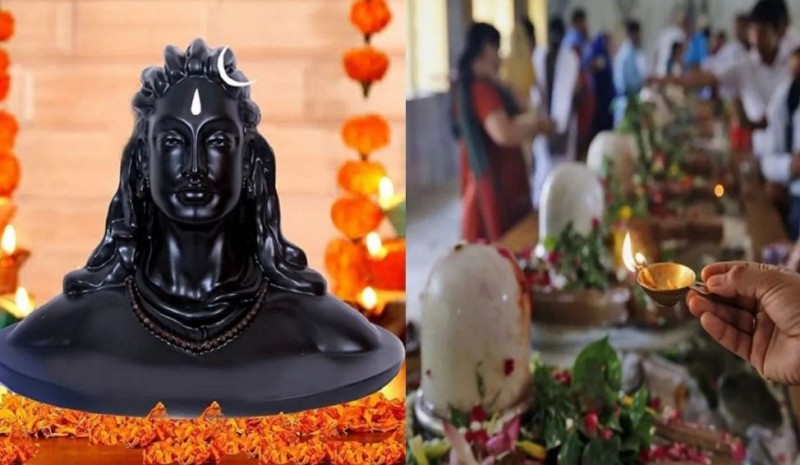
Pashupati Vrat is a sacred fast dedicated to Lord Shiva, also known as Bholeshankar. This fast is observed by those facing numerous problems and challenges in life, unable to find solutions or share their difficulties with others. The fast is believed to help fulfill their wishes and receive blessings from Lord Shiva, who symbolizes the cycle of life as the god of destruction and creation.
When to Observe Pashupati Vrat:
Pashupati Vrat is observed on Monday, considered extremely auspicious for Lord Shiva. Devotees observe fasts and perform rituals on this day to seek His blessings.
Duration of Observance and How Many Mondays:
This fast can be done in the Krishna Paksha or Shukla Paksha of any month, provided there is a Monday. For desired results, follow the fast with rituals for five consecutive Mondays.
How to Perform Pashupati Vrat:
Rules of Pashupati Vrat:
Like every fast, Pashupati Vrat has specific rules. Visit Lord Shiva's temple in the morning, offer belpatra and panchamrit. In the evening, prepare something sweet for offering to Lord Shiva, dividing it into three parts. Keep one part for yourself and offer the remaining two to Lord Shiva. Take six lamps with bhog while going to the temple. Light five of them in front of Lord Shiva and bring one lamp back home. Place this lamp on the right side before entering the house. While breaking the fast, consume a portion of the prasad.
Pashupati Vrat Festival:
This fast is performed for five consecutive Mondays and celebrated afterward. On the fifth Monday, after the worship during Pradosh Kaal, offer a coconut to Lord Shiva, expressing your wishes. If possible, offer 108 belpatra or akshat rice to Lord Shiva. By the sixth Monday, all your wishes will be fulfilled.
Chant Mahadev's Favorite Mantras:
Om Namah Shivaya
Namo Neelkanthi
Om Parvatipataye Namah
Om Haram Harun Namah Shivaya
Om Namo Bhagavate Dakshinamurtaye Maham Medha Prayachha Swaha
Read or Listen to Pashupati Katha:
Devotees can read or listen to the story of Pashupati Vrat, highlighting its significance and miraculous benefits.
Follow the Fasting Rules:
Maintain complete devotion and dedication throughout the fasting period. Avoid gossip, anger, and negative thoughts. Use this time for introspection and seek guidance from Lord Shiva to find solutions to your problems.
Donations and Services:
If possible, engage in charitable activities to serve others, increasing kindness and compassion.
Importance of Monday Fast:
Pashupati Vrat on Monday holds great significance in Hinduism. It is believed that Lord Shiva especially accepts prayers and offerings from His devotees on this day, bestowing strength, courage, and wisdom to overcome life's obstacles.
Importance of Pashupati Vrat:
Pashupati Vrat holds a deep spiritual meaning beyond being a mere ritualistic fast. Through this fast, devotees seek blessings from Lord Shiva for mental peace, challenges, and solutions to their problems. It represents complete surrender to God, acknowledging that all challenges and solutions lie in His hands.
Legend of Pashupati Vrat:
Various stories are associated with Pashupati Vrat. One popular legend revolves around a poor Brahmin named Sudharma, who, facing immense hardships, started the vrat with unwavering faith and devotion. As a result, he received divine blessings, and his life turned prosperous and peaceful. Inspired by this miraculous change, others began following the vrat, increasing its popularity.
Fulfillment of Wishes:
Devotees observe Pashupati Vrat with the belief that it will fulfill their wishes and desires. However, it is essential to remember that prayer and fasting should not be motivated solely by material desires. Instead, fasting encourages spiritual growth and connection with the divine, seeking enlightenment.
Devotional Practices during Pashupati Vrat:
Apart from fasting and prayer, devotees can engage in additional devotional practices during Pashupati Vrat. These may include reading bhajans and texts dedicated to Lord Shiva, performing Rudra Abhishek (a ceremonial bath of the Shiva Linga with various sacred objects), and participating in bhajans and kirtans (devotional songs).
Pashupati Vrat is a revered fast celebrated by devotees to seek solutions to their problems and divine blessings from Lord Shiva. It is an opportunity to develop unwavering faith, patience, and perseverance in the face of challenges. Through this fast, devotees learn to let go of their worries and trust that God will guide them on the right path. The essence of any fast or religious practice lies in the sincerity and devotion with which it is performed. While praying for personal desires, it is equally important to seek the well-being and peace of all beings. By observing Pashupati Vrat with an open heart and pure intentions, devotees can experience inner transformation and find solace through the grace of Lord Shiva.
Inside Ron DeSantis' Spiritual Journey and Political Path
Unraveling Adolf Hitler's Religious Beliefs: A Complex Historical Inquiry